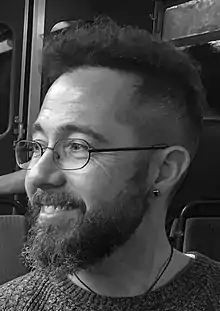Carlos Andrés Segovia
Carlos Andrés Segovia y Corral, 2nd Marquis of Salobreña (born 22 May 1970) is a Spanish nobleman and academic specialising in philosophy and religious studies.
The Marquis of Salobreña | |
|---|---|
 Philosopher and scholar of religion Carlos A. Segovia | |
| Background information | |
| Birth name | Carlos Andrés Segovia y Corral |
| Born | 22 May 1970 |
| Occupation(s) | Academic |
He is a reader in religious studies at Saint Louis University in Madrid, Spain.[1]
While over the past ten years he has mostly worked on late-antique religion (with special emphasis on the intertwining of group-identity markers, sectarian boundaries, discursive strategies, and more generally the conceptualisation of hybridity and ambiguity in religious origins, as a means to counter present-day religious fundamentalism, ethnocentrism, and xenophobia), his current research focuses instead on contemporary philosophy at the crossroads of religious studies and anthropological theory along three intersecting axes: (1) the analysis of capitalism’s religious matrix and semiotic structure, and of its counter-figures, against the background of today’s cosmopolitical crisis, in dialogue with the philosophy of Deleuze and Guattari; (2) the study of extra-modern, especially animist, ontologies, and the subsequent revision of conceptual production in the social sciences and the humanities vis-à-vis today’s hegemonic regimes of power/knowledge, in dialogue with the work of Lévi-Strauss; and (3) the post-nihilist rethinking of dwellingness and, thereby, of the differences between earth, world, and unworld, in dialogue with both Heidegger’s late philosophy and non-religious Greek views on the sacred. He is also series co- editor of Apocalypticism: Cross-disciplinary Explorations at Peter Lang.[2]
He is the author of numerous scholarly books and articles, including the monographs Immanence and the Sacred,[3] The Quranic Noah and the Making of the Islamic Prophet: A Study of Intertextuality and Religious Identity Formation in Late Antiquity,[4] and The Quranic Jesus: A New Interpretation;[5] the edited volume Remapping Emergent Islam: Texts, Social Settings, and Ideological Trajectories;[6] and articles like "Spinoza as Savage Thought," [7] "Post-Heideggerian Drifts: From Object-Oriented-Ontology Worldlessness to Post-Nihilist Worldings," [8] and "The New Animism: Experimental, Isomeric, Liminal, and Chaosmic"; [9] plus he writes regularly on philosophy on polymorph.blog.[10]
He is the youngest child of the celebrated classical guitarist Andrés Segovia, the first Marquis of Salobreña.[11]
Notes
- Saint Louis University, Madrid Campus
- Peter Lang International Academic Publishers ACE Series
- Almuzara Ensayo (in Spanish)
- Walter de Gruyter JCIT Series
- Walter de Gruyter JCIT Series
- Amsterdam University Press
- Rhizomes: Cultural Studies in Emerging Knowledge
- Das Questões: Filosofia, Tradução, Arte
- Thémata. Revista de Filosofía (in Spanish)
- polymorph.blog: rethinking ideas, reimagining worlds
- Genealogy of the Marquesses of Salobreña